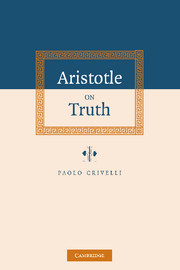Book contents
- Frontmatter
- Contents
- Acknowledgements
- Notes on the text
- List of abbreviations of titles of Aristotle's works
- Introduction
- Part I BEARERS OF TRUTH OR FALSEHOOD
- Part II ‘EMPTY’ TERMS
- Chapter 4 Truth as correspondence
- Chapter 5 ‘Vacuous’ terms and ‘empty’ terms
- Part III TRUTH AND TIME
- Appendix 1 Metaph. Θ 10, 1051b1: the text
- Appendix 2 Metaph. Θ 10, 1051b2–3: the text
- Appendix 3 Int. 7, 17b16–18: the text
- Appendix 4 The two-place relations in Aristotle's definition of truth
- Appendix 5 Aristotle's theory of truth for predicative assertions: formal presentation
- Appendix 6 The failure of bivalence for future-tense assertions: formal presentation
- References
- Index of names
- Index of subjects
- Index of passages
Chapter 4 - Truth as correspondence
Published online by Cambridge University Press: 22 September 2009
- Frontmatter
- Contents
- Acknowledgements
- Notes on the text
- List of abbreviations of titles of Aristotle's works
- Introduction
- Part I BEARERS OF TRUTH OR FALSEHOOD
- Part II ‘EMPTY’ TERMS
- Chapter 4 Truth as correspondence
- Chapter 5 ‘Vacuous’ terms and ‘empty’ terms
- Part III TRUTH AND TIME
- Appendix 1 Metaph. Θ 10, 1051b1: the text
- Appendix 2 Metaph. Θ 10, 1051b2–3: the text
- Appendix 3 Int. 7, 17b16–18: the text
- Appendix 4 The two-place relations in Aristotle's definition of truth
- Appendix 5 Aristotle's theory of truth for predicative assertions: formal presentation
- Appendix 6 The failure of bivalence for future-tense assertions: formal presentation
- References
- Index of names
- Index of subjects
- Index of passages
Summary
Can Aristotle's theory of truth for assertions be regarded as a correspondence theory of truth? Section 1 argues that on certain conceptions of truth as correspondence it cannot, but on at least one other it can. Specifically, Aristotle's theory of truth can be regarded as a correspondence theory of truth in that it can be regarded as taking the truth of an assertion to amount to a relation of isomorphism to reality. In particular: it relies on a classification of assertions, with each class it associates some characteristic that can hold of the items an assertion is about, and it claims that an assertion is true when and only when the characteristic associated with its class holds of the items it is about.
Section 2 addresses Aristotle's reaction to the Liar, which creates a puzzle for correspondence theories of truth like Aristotle's. It is not clear whether Aristotle addressed the Liar, and, in case he did, what version of it he confronted. On the somewhat optimistic assumption that he did address a robust version of the paradox, his solution is that the assertion on which the paradox turns (an utterance of the sentence-type ‘I am speaking falsely’) is sometimes neither true nor false.
A CORRESPONDENCE THEORY OF TRUTH?
Focusing on truth for assertions. The theory of truth we are in the best position to attribute to Aristotle is a theory of truth for assertions (utterances) (it was described in chapters 2 and 3).
- Type
- Chapter
- Information
- Aristotle on Truth , pp. 129 - 151Publisher: Cambridge University PressPrint publication year: 2004



